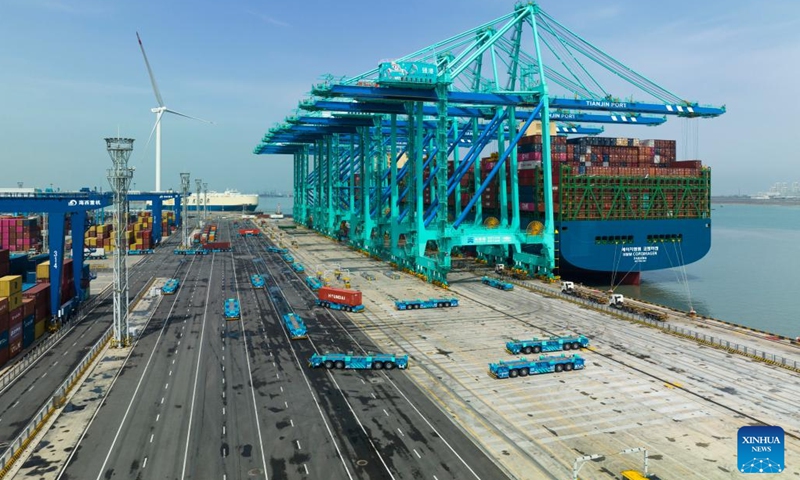
This aerial photo taken on April 6, 2023 shows a container ship at the smart zero-carbon terminal of Tianjin Port in north China's Tianjin.(Photo: Xinhua)
China and Ecuador signed a free trade agreement (FTA) on Thursday after a year of negotiations. Analysts said the pact would provide impetus to bilateral trade and investment.
Businessmen welcomed the FTA, affirming that it bodes well for closer cooperation between enterprises from both countries.
Through the FTA, China and Ecuador will open up to each other at a substantially high level, and create a favorable, convenient, transparent and stable environment for the businesses, according to a statement by China's Ministry of Commerce (MOFCOM) on Thursday.
The agreement will help tap the potential of bilateral trade and investment cooperation; upgrade economic and trade cooperation in an all-round way; promote sustained and diversified development of bilateral trade, and improve the well-being of the two peoples and enterprises, said MOFCOM.
The two sides will implement domestic procedures to ratify the deal and enable the deal to become effective at an earlier date. China and Ecuador will conduct further negotiations on areas of common interest and upgrade the FTA in the future, MOFCOM said.
China and Ecuador will eliminate tariffs on 90 percent of their products, with about 60 percent to be eliminated immediately after the FTA deal comes into force.
All of Ecuador's major exports to China will be tariff-free under the FTA. The tariff rate on Ecuador's bananas, white shrimp, fish, fish oil, flowers and dried flowers, cocoa and coffee will be reduced from current 5-20 percent to zero.
Tariffs on China's exports to Ecuador, including plastics, chemical fibers, steel products, machinery and appliances, electrical equipment, furniture decoration, automobiles and spare parts, will be gradually reduced to zero from the current 5-40 percent.
Analysts said that the FTA will boost bilateral trade. In 2022, bilateral trade reached $13.1 billion, up 19.7 percent year-on-year. China is Ecuador's second largest trading partner last year, according to statistics from the General Administration of Customs.
"In addition to the convenience of trade, the most important thing is the FTA represents the stability of economic and trade relations between China and Ecuador, which will boost business activities," a manager surnamed Su at a Guangzhou-based e-commerce company told the Global Times on Thursday.
It is widely believed among Chinese foreign traders that exporting to the US and Europe may be difficult in 2023, and everyone is turning to markets in Southeast Asia, South America and countries involved in the Belt and Road Initiative (BRI), said Su.
"We have been making inroads in Latin American market. At the just-ended Canton Fair, we contacted some buyers from Latin American countries. Now we are processing the orders," Su said, before boarding a flight to Chile.
It is expected that more Chinese companies will expand their investment in Ecuador after the signing of the bilateral FTA, Jiang Shixue, professor at the Center for Latin American Studies at Shanghai University, told the Global Times.
"The FTA will also have a spillover effect on deepening cooperation between China and other Latin American countries," Jiang noted.
The China-Ecuador FTA is the 20th FTA signed between China and other countries, making Ecuador China's 27th FTA partner and China's fourth FTA partner in Latin America, after Chile, Peru and Costa Rica.
Starting on May 1, some exports from Nicaragua were able to enter China tariff-free, under the Early Harvest Arrangement prior to a bilateral FTA.
Ecuador is an important economic and trade partner of China in Latin America, a major import source of agricultural, fishery and mineral products, and also an important partner under the BRI platform, according to MOFCOM.




